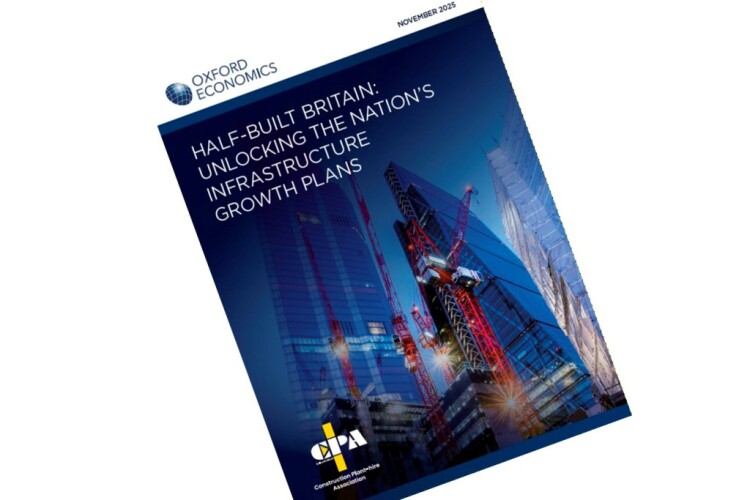This post was originally published on this site
https://www.theconstructionindex.co.uk/assets/news_articles/2025/11/1762933286_cpa180-oxford-economics.jpgA report by Oxford Economics for the Construction Plant-hire Association warns that skills shortages, falling investment and delivery delays are threatening to derail the government’s growth plans.
The report, titled Half-built Britain: Unlocking the nation’s infrastructure growth plans, warns that “announcements are outpacing delivery capacity”, with too few projects fully costed or shovel-ready.
Flagship projects, from new hospitals and homes to airport expansions, are at risk of grinding to a halt, the report warns.
The analysis warns that while ministers talk of “getting Britain building”, much of the pipeline “lacks the workforce, certainty or funding to move beyond announcements”. Businesses that provide the machinery and skilled operators underpinning construction say they cannot plan or invest without predictable workloads, leaving delivery capacity “dangerously thin”.
The report paints a stark picture:
- the UK needs 250,000 additional construction workers to deliver planned projects – yet nearly half a million are due to retire in the next 15 years
- 44% of firms report labour shortages restricting activity
- apprenticeship completion has slumped and wage rates for the young in construction has fallen below in the retail sector
- Construction productivity has falled by 0.1% a year since 1997, leaving output per worker below 1990s levels.
- Only 14% of major government projects are rated as being on track, and less than half the National Infrastructure Pipeline has confirmed costs or funding.
- Funding certainty plunges from 68% this year to just 33% by 2030, creating what Oxford Economics calls “a crisis of confidence” for investors and contractors.
The report identifies Britain’s productivity problem as primarily a capital problem. Decades of under-investment in machinery, technology and infrastructure have left the UK falling behind its competitors. Whereas manufacturing productivity has risen by 3.5% a year since the late 1990s, construction has gone backwards, it says.
Steven Mulholland, chief executive of the Construction Plant-hire Association (CPA), said: “This report is a call to action for ministers. Britain’s construction pipeline is cracking under the strain of unrealistic targets, uncertain funding and a shrinking workforce.

“Unless the government restores confidence and fixes the fundamentals, the next decade will be defined by half-built promises and rising costs.
“The plant-hire sector is one of the most capital-intensive in the economy, with our members shouldering much of the investment risk needed to keep Britain building. With stable policy and predictable pipelines, we can channel private capital into public infrastructure without adding to national debt.
“If ministers match our willingness to invest with clarity and confidence, we can turn ambition into action and build the growth, jobs and prosperity Britain needs.”
Oxford Economics notes that while government capital spending is set to rise by 3.6% annually to 2029-30, much of this increase is already absorbed by energy transition costs and existing liabilities – leaving transport, housing and local infrastructure underfunded.
The report was commissioned by the CPA to add weight to its submission to the Treasury with a package of policy proposals to the Treasury ahead of the budget later this month.
The CPA’s proposals include:
- fix the pipeline – publish a fully costed update of the National Infrastructure Pipeline with secured funding beyond 2028.
- reverse the rise in employer National Insurance, easing labour-cost pressures across construction supply chains
- extend full expensing to leased assets, allowing hire firms to reinvest £1.3bn a year in new capital equipment.
- maintain the current fuel duty rate, protecting construction SMEs hit by the loss of red-diesel relief
- retain business property relief, preventing succession-related closures of family-run firms
- reform the growth and skills levy to give employers full flexibility and fund all SME apprenticeships.
Got a story? Email [email protected]


